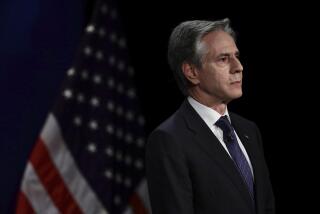Administration Condemns Gorbachev’s Call for Legislature to Suspend Press Law : Freedom: The Senate urges Bush to consider cutting off aid to Soviet Union because of the Lithuania assault. Scholars warn of Stalinist tactics.
- Share via
WASHINGTON — The Bush Administration on Wednesday deplored Soviet President Mikhail S. Gorbachev’s moves to restrict press freedom, and the Senate asked President Bush to consider cutting off all economic aid to the Soviet Union in the wake of the bloody military crackdown in Lithuania.
The strong criticism by the White House, the State Department and Capitol Hill came amid warnings by noted scholars that the Kremlin appears to be turning the clock back to methods of repression used by dictator Josef Stalin and his hard-line successors.
Acting without dissent, the Senate on a voice vote approved a resolution requesting Bush to withhold most-favored-nation trade status for the Soviet Union unless Soviet troops stop interfering with elected governments in Lithuania, Latvia and Estonia.
But the senators expressed no opinion on whether Bush should go to Moscow next month for a planned summit with Gorbachev so soon after 14 Lithuanians were killed and hundreds were injured when Soviet tanks and troops opened fire to seize a broadcast station early Sunday morning. The White House already has said that the summit talks may be postponed.
The resolution was intended as a strong signal to Gorbachev that the United States would not provide food aid, credits and technical assistance while the Soviet regime condoned or ordered military repression of independence movements in the three Baltic republics.
“We will not tolerate unknown and unnamed Kremlin apparat (organizations) implementing a neo-Stalinist crackdown in the Baltics while we practice business as usual with Gorbachev in Moscow,” Senate Minority Leader Bob Dole (R-Kan.) said.
“Our fundamental commitment is not to Gorbachev--but to his reformist policies and if he turns his back on those policies--the deal is off,” Dole added.
Sen. Robert C. Byrd (D-W. Va.), a chief sponsor of the Senate resolution, suggested that the Bush Administration failed to protest earlier attempts to stifle Baltic bids for autonomy because it wanted Soviet cooperation in the Persian Gulf crisis.
“It would be a travesty to concentrate so much of our nation’s energy on stopping Iraqi aggression and freeing Kuwait, while ignoring Soviet aggression in the captive Baltic nations,” Byrd said.
Meanwhile, Gorbachev’s unexpected proposal to suspend the 7-month-old Soviet press freedom law to achieve more “objectivity” drew fire from White House Press Secretary Marlin Fitzwater. (Liberal Soviet lawmakers in the legislature denounced Gorbachev’s move and forced the proposal into a parliamentary commission for study.) “It is not a good sign that he (Gorbachev) is looking to subdue or muzzle the press as a way of getting ‘objectivity,’ ” Fitzwater said of the Soviet leader who won praise for his original program of glasnost, or openness.
At the State Department, spokeswoman Margaret Tutwiler echoed the criticism, saying of Gorbachev’s idea: “It is obviously a step in the wrong direction.”
Meanwhile, Secretary of State James A. Baker III complained about the crackdown in the Baltics to the new Soviet foreign minister, Alexander A. Bessmertnykh, in a telephone call to Moscow.
“He (Baker) emphasized that continued Soviet commitment to the process of reform would be essential to U.S.-Soviet cooperation,” Tutwiler told reporters. “He told the (foreign) minister that the United States sees absolutely no justification for the use of force against a peaceful and democratically elected government of Lithuania.”
In the Senate debate on the Lithuanian resolution, no one said a kind word for Gorbachev, once highly popular as the architect of change in Soviet foreign and domestic policies.
“Soviet power is acting like a dying brute,” said Sen. Christopher J. Dodd (D-Conn.). Senate Majority Leader George J. Mitchell (D-Me.) added: “Pursuing the current course of crackdown and repression in the Baltic states will have grave consequences.”
More to Read
Get the L.A. Times Politics newsletter
Deeply reported insights into legislation, politics and policy from Sacramento, Washington and beyond. In your inbox twice per week.
You may occasionally receive promotional content from the Los Angeles Times.










